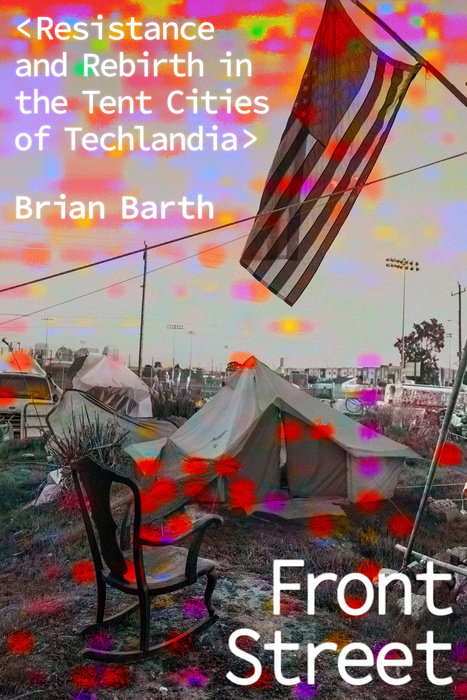
In his first book, award-winning investigative journalist Brian Barth takes us on an immersive journey deep into Silicon Valley’s homeless encampments, challenging everything we thought we knew about our unhoused neighbors.
In this wide-reaching portrait of the constellation of people living in tents, shacks, and cars in the shadow of tech campuses and skyscrapers, award-winning journalist Brian Barth introduces us to the misfits, activists, and iconoclasts of Silicon Valley’s homeless encampments. Blending memoir, investigative reporting, history, and cultural criticism to paint a portrait of a community searching for dignity and connection in the midst of a national crisis, Front Street is a conversation-changing story about the struggle for housing.
This immersive work follows residents of three distinct camps—Crash Zone in San Jose, Wood Street in Oakland, and Wolfe Camp in Cupertino. Regularly harassed by police and local government, and frequently at risk of often violent and always destabilizing sweeps, these camps may seem chaotic to some but more often than not, to their residents they are sites of refuge and rebirth. In research on 19th- and 20th-century homelessness and philosophical contemplations of communal anarchy, and through honest conversations with residents, Barth shows how the solution to homelessness isn't as straightforward as one might think.
Front Street considers the root causes and possible solutions to chronic homelessness, contemplating political, economic, social and spiritual approaches alike. With empathy and poise, Barth follows this cast of characters, describing their personal stories, quotidian experiences, private philosophies and political activism. In doing so, Front Street explains why the country's current approach to homelessness has become at once cruel and ineffective and makes the radical argument that encampments, when treated generously and fairly, have something important to teach the rest of us about autonomy, dignity, connection and care.
Book Details
“In Front Street, Brian Barth peels back the tarps of America’s modern tent cities, immersing himself—and us—deep into the improvised lives of the unconventionally housed. Barth’s great achievement is not that he portrays society’s broken souls with empathy, though he extends uncommon grace to those typically looked on as a nuisance. It’s that he uncovers a weird sort of paradise in the chaos and discomfort of the encampments: a tolerance, a purpose, a togetherness scrubbed from so many of our tidier communities. This book will forever change your perception of the ‘homeless crisis’ and the doomed attempts to sweep it away.”
—Jesse Katz, author of The Rent Collectors
"If you want to understand what it’s like to live in poverty at the edge of great wealth, read this gentle, generous book. It will remind you of what it means to be human in an era of high technology."
—Fred Turner, author, with Mary Beth Meehan, of Seeing Silicon Valley: Life Inside a Fraying America
“This powerful and unflinchingly compassionate book challenges us to see our unhoused neighbors not as a problem to be solved, but as people to be known—wise, resilient, and deeply human.”
—Kevin F. Adler, founder of Miracle Messages and author of When We Walk By: Forgotten Humanity, Broken Systems, and the Role We Can Each Play in Ending Homelessness in America
"Filled with tenderness and keen insight, Front Street shows us the resilience and movement building capacity of encampments like Wood Street, Wolfe Camp, and Crash Zone. A sweeping reckoning and indictment of the state-sanctioned violence inflicted against our unhoused community members."
—Tristia Bauman, Directing Attorney of Housing at the Law Foundation of Silicon Valley
"Brian Barth has done a tremendous service with his book, not only for those who are unhoused on the streets of America but for those of us who are housed. He has managed to capture the humanity of those who have fallen through the cracks and can no longer afford to pay for their housing. But he has also shown us housed Americans that there are amazingly compassionate communities within the shanty towns and encampments who are generously supportive of each other despite all the sufferings that come with living on the streets."
—Mike Pyatok, award-winning architect of affordable housing and author of Good Neighbors: Affordable Family Housing

